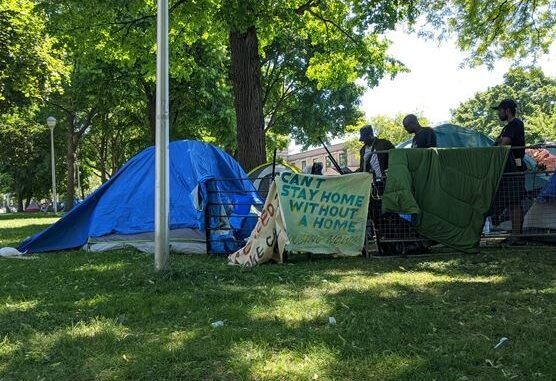
The City of Toronto has received the Ombudsman Toronto Final Report Investigation into the City’s Clearing of Encampments in 2021 and accepts the recommendations of the final report.
The City thanks Ombudsman Kwame Addo and his staff, community advocates, those with lived experience in encampments and from marginalized communities, and City staff for their contributions to the report.
The City is committed to the use of a people-first, client-centred approach to help connect those living in encampments with services including shelter and housing. The City’s Streets to Homes outreach team and partner agencies conduct outreach to proactively connect with people living outdoors, 24 hours per day, seven days a week, year-round. In 2022, there were approximately 1,277 referrals from Streets to Homes offering indoor space to those living outside, 1,112 of which were from encampments.
This Housing-First approach has reduced the number of people living in encampments, which grew significantly in the first year of the COVID-19 pandemic, to pre-pandemic levels. During the time that is the focus of the Ombudsman’s report in June 2021, there were 370 encampments in 58 City greenspace locations. Although encampment activity is often seasonal, as of March 23, 2023, the number of park encampments is 75 in 23 City greenspaces.
The City operates a system of more than 1,500 parks and ravines as shared recreational spaces for the benefit of the community. The City uses a multi-divisional approach to respond to the complex health and safety risks in and around encampments, facilitate access to services including shelter and housing, removal of waste and debris, and ensure shared-use spaces are accessible to all.
Enhanced outreach services and Housing First practices at these locations focus on connecting with individuals living in encampments and other outdoor areas to build trusting relationships, help address immediate health and safety needs and find permanent housing. Outreach staff visit various sites daily to work with encampment occupants on referrals to space in the shelter system and to connect them with a housing worker. In 2022, Streets to Homes teams attended encampment locations 3,752 times.
As noted in the Ombudsman’s report, an outreach model implemented in Dufferin Grove Park, enhanced through collaboration with community partners at the advisory and operational level, brought comprehensive social and health service supports directly to the park to reduce service barriers and promote client self-determination. All individuals encountered by staff in the Dufferin Grove encampment were offered referral to shelter. In total, Between August and December 2021, 90 individuals had successful outcomes such as referrals to shelter programs, transition to permanent housing or family reunification. A total of 101 encampments were removed as individuals left the park.
The City cannot force people to come inside and use the many services offered in shelters but it continues to encourage people to accept offers of shelter and housing options.
The City is focused on making homelessness rare, brief and non-recurring and all Toronto shelters work from a Housing First approach to ensure that shelter service delivery is premised on the idea that stable housing is the primary need for individuals or families experiencing homelessness. Last year alone the City helped more than 4,300 people move from the shelter system into permanent housing. The City’s shelter system has expanded from approximately 4,000 spaces in 2016 to around 9,000 beds today, offered at more than 100 locations across the city.
As noted, the City is committed to ensuring a Housing First approach but the rate of those entering homelessness continues to increase. New and enhanced investments are urgently needed from the Government of Canada and Province of Ontario to complement City investments and increase the supply of deeply affordable rental housing with supports that include harm reduction and mental health supports. In addition to new housing supply and support services, investments in homelessness prevention programs and poverty reduction measures are necessary to prevent more households from falling into homelessness.
SOURCE City of Toronto

Leave a Reply